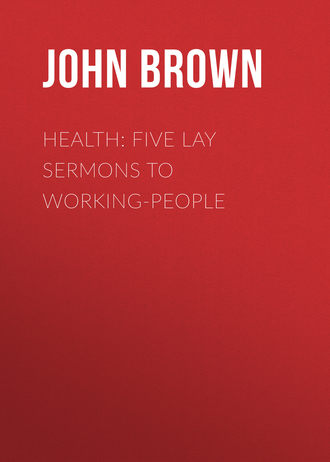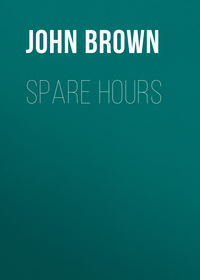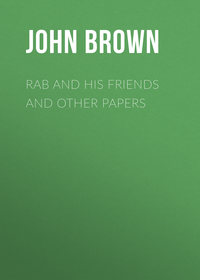 полная версия
полная версияHealth: Five Lay Sermons to Working-People
Vaccination.– One word for this. Never neglect it; get it done within two months after birth, and see that it is well done; and get all your neighbors to do it.
Infectious Diseases.– Keep out of their way; kill them by fresh air and cleanliness; defy them by cheerfulness, good food (better food than usual, in such epidemics as cholera), good sleep, and a good conscience.
When in the midst of and waiting on those who are under the scourge of an epidemic, be as little very close to the patient as you can, and don't inhale his or her breath or exhalations when you can help it; be rather in the current to, than from him. Be very cleanly in putting away all excretions at once, and quite away; go frequently into the fresh air; and don't sleep in your day clothes. Do what the Doctor bids you; don't crowd round your dying friend; you are stealing his life in taking his air, and you are quietly killing yourself. This is one of the worst and most unmanageable of our Scottish habits, and many a time have I cleared the room of all but one, and dared them to enter it.
Then you should, in such things as small-pox, as indeed in everything, carry out the Divine injunction, "Whatsoever ye would that men should do unto you, do ye even so to them." Don't send for the minister to pray with and over the body of a patient in fever or delirium, or a child dying of small-pox or malignant scarlet fever; tell him, by all means, and let him pray with you, and for your child. Prayers, you know, are like gravitation, or the light of heaven; they will go from whatever place they are uttered; and if they are real prayers, they go straight and home to the centre, the focus of all things; and you know that poor fellow with the crust of typhus on his lips, and its nonsense on his tongue, – that child tossing in misery, not knowing even its own mother, – what can they know, what heed can they give to the prayer of the minister? He may do all the good he can, – the most good maybe when, like Moses on the hillside, in the battle with Amalek, he uplifts his hands apart. No! a word spoken by your minister to himself and his God, a single sigh for mercy to him who is mercy, a cry of hope, of despair of self, opening into trust in him, may save that child's life, when an angel might pour forth in vain his burning, imploring words into the dull or wild ears of the sufferer, in the vain hope of getting him to pray. I never would allow my father to go to typhus cases; and I don't think they lost anything by it. I have seen him rising in the dark of his room from his knees, and I knew whose case he had been laying at the footstool.
And now, my dear friends, I find I have exhausted our time, and never yet got to the sermon, and its text – "That the way of God" – what is it? It is his design in setting you here; it is the road he wishes you to walk in; it is his providence in your minutest as in the world's mightiest things; it is his will expressed in his works and word, and in your own soul it is his salvation. That it "may be known," that the understandings of his intelligent, responsible, mortal and immortal creatures should be directed to it, to study and (as far as we ever can or need) to understand that which, in its fulness, passes all understanding; that it may be known "on the earth," here, in this very room, this very minute; not, as too many preachers and performers do, to be known only in the next world, – men who, looking at the stars, stumble at their own door, and it may be smoor their own child, besides despising, upsetting, and extinguishing their own lantern. No! the next world is only to be reached through this; and our road through this our wilderness is not safe unless on the far beyond there is shining the lighthouse on the other side of the dark river that has no bridge. Then "His saving health"; His health – whose? – God's – his soundness, the wholeness, the perfectness, that is alone in and from him, – health of body, of heart, and brain, health to the finger-ends, health for eternity as well as time. "Saving"; we need to be saved, and we are salvable, this is much; and God's health can save us, that is more. When a man or woman is fainting from loss of blood, we sometimes try to save them, when all but gone, by transfusing the warm rich blood of another into their veins. Now this is what God, through his Son, desires to do; to transfuse his blood, himself, through his Son, who is himself, into us, diseased and weak. "And" refers to his health being "known," recognized, accepted, used, "among all nations"; not among the U.P.s, or the Frees, or the Residuaries, or the Baptists, or the New Jerusalem people, – nor among us in the Canongate, or in Biggar, or even in old Scotland, but "among all nations"; then, and only then, will the people praise thee, O God; will all the people praise thee. Then, and then only, will the earth yield her increase, and God, even our own God, will bless us. God will bless us, and all the ends of the earth shall fear him.
And now, my dear and patient friends, we must say good night. You have been very attentive, and it has been a great pleasure to me as we went on to preach to you. We came to understand one another. You saw through my jokes, and that they were not always nothing but jokes. You bore with my solemnities, because I am not altogether solemn; and so good night, and God bless you, and may you, as Don Quixote, on his death-bed, says to Sancho, May you have your eyes closed by the soft fingers of your great-grandchildren. But no, I must shake hands with you, and kiss the bairns, – why shouldn't I? if their mouths are clean and their breath sweet? As for you, Ailie, you are wearying for the child; and he is tumbling and fretting in his cradle, and wearying for you; good by, and away you go on your milky way. I wish I could (unseen) see you two enjoying each other. And good night, my bonnie wee wifie; you are sleepy, and you must be up to make your father's porridge; and Master William Winkie, will you be still for one moment while I address you? Well, Master William, wamble not off your mother's lap, neither rattle in your excruciating way in an airn jug wi' an airn spoon; no more crowing like a cock, or skirlin' like a kenna-what. I had much more to say to you, sir, but you will not bide still; off with you, and a blessing with you.
Good night, Hugh Cleland, the best smith of any smiddy; with your bowly back, your huge arms, your big heavy brows and eyebrows, your clear eye, and warm unforgetting heart. And you, John Noble, let me grip your horny hand, and count the queer knobs made by the perpetual mell. I used, when I was a Willie Winkie, and wee, to think that you were born with them. Never mind, you were born for them, and of old you handled the trowel well, and built to the plumb. Thomas Bertram, your loom is at a discount, but many's the happy day I have watched you and your shuttle, and the interweaving treadles, and all the mysteries of setting the "wab." You are looking well, and though not the least of an ass, you might play Bottom must substantially yet. Andrew Wilson, across the waste of forty years and more I snuff the fragrance of your shop; have you forgiven me yet for stealing your paint-pot (awful joy!) for ten minutes to adorn my rabbit-house, and for blunting your pet furmer? Wise you were always, and in the saw-pit you spoke little, and wore your crape. Yourself wears well, but take heed of swallowing your shavings unawares, as is the trick of you "wrights"; they confound the interior and perplex the Doctor.
Rob Rough, you smell of rosin, and your look is stern, nevertheless, or all the rather, give me your hand. What a grip! You have been the most sceptical of all my hearers; you like to try everything, and you hold fast only what you consider good; and then on your crepida or stool, you have your own think about everything human and divine, as you smite down errors on the lapstane, and "yerk" your arguments with a well-rosined lingle; throw your window open for yourself as well as for your blackbird; and make your shoes not to pinch. I present you, sir, with a copy of the book of the wise Switzer.
And nimble Pillans, the clothier of the race, and quick as your needle, strong as your corduroys, I bid you good night. May you and the cooper be like him of Fogo, each a better man than his father; and you, Mungo the mole-catcher, and Tod Laurie, and Sir Robert the cadger, and all the other odd people, I shake your fists twice, for I like your line. I often wish I had been a mole-catcher, with a brown velveteen, or (fine touch of tailoric fancy!) a moleskin coat; not that I dislike moles, – I once ate the fore-quarter of one, having stewed it in a Florence flask, some forty years ago, and liked it, – but I like the killing of them, and the country by-ways, and the regularly irregular life, and the importance of my trade.
And good night to you all, you women-folks. Marion Graham the milkwoman; Tibbie Meek the single servant; Jenny Muir the sempstress; Mother Johnston the howdie, thou consequential Mrs. Gamp, presiding at the gates of life; and you in the corner there, Nancy Cairns, gray-haired, meek and old, with your crimped mutch as white as snow; the shepherd's widow, the now childless mother, you are stepping home to your bein and lonely room, where your cat is now ravelling a' her thrums, wondering where "she" is.
Good night to you all, big and little, young and old; and go home to your bedside, there is Some One waiting there for you, and his Son is here ready to take you to him. Yes, he is waiting for every one of you, and you have only to say, "Father, I have sinned, – take me" – and he sees you a great way off. But to reverse the parable; it is the first-born, your elder brother, who is at your side, and leads you to your Father, and says, "I have paid his debt"; that Son who is ever with him, whose is all that he hath.
I need not say more. You know what I mean. You know who is waiting, and you know who it is who stands beside you, having the likeness of the Son of Man. Good night! The night cometh in which neither you nor I can work, – may we work while it is day; whatsoever thy hand findeth to do, do it with thy might, for there is no work or device in the grave, whither we are all of us hastening; and when the night is spent, may we all enter on a healthful, a happy, an everlasting to-morrow!
1
Frederick the Great kept an aid-de-camp for this purpose, and, poor fellow! he sometimes wore them too long, and got a kicking for his pains.



